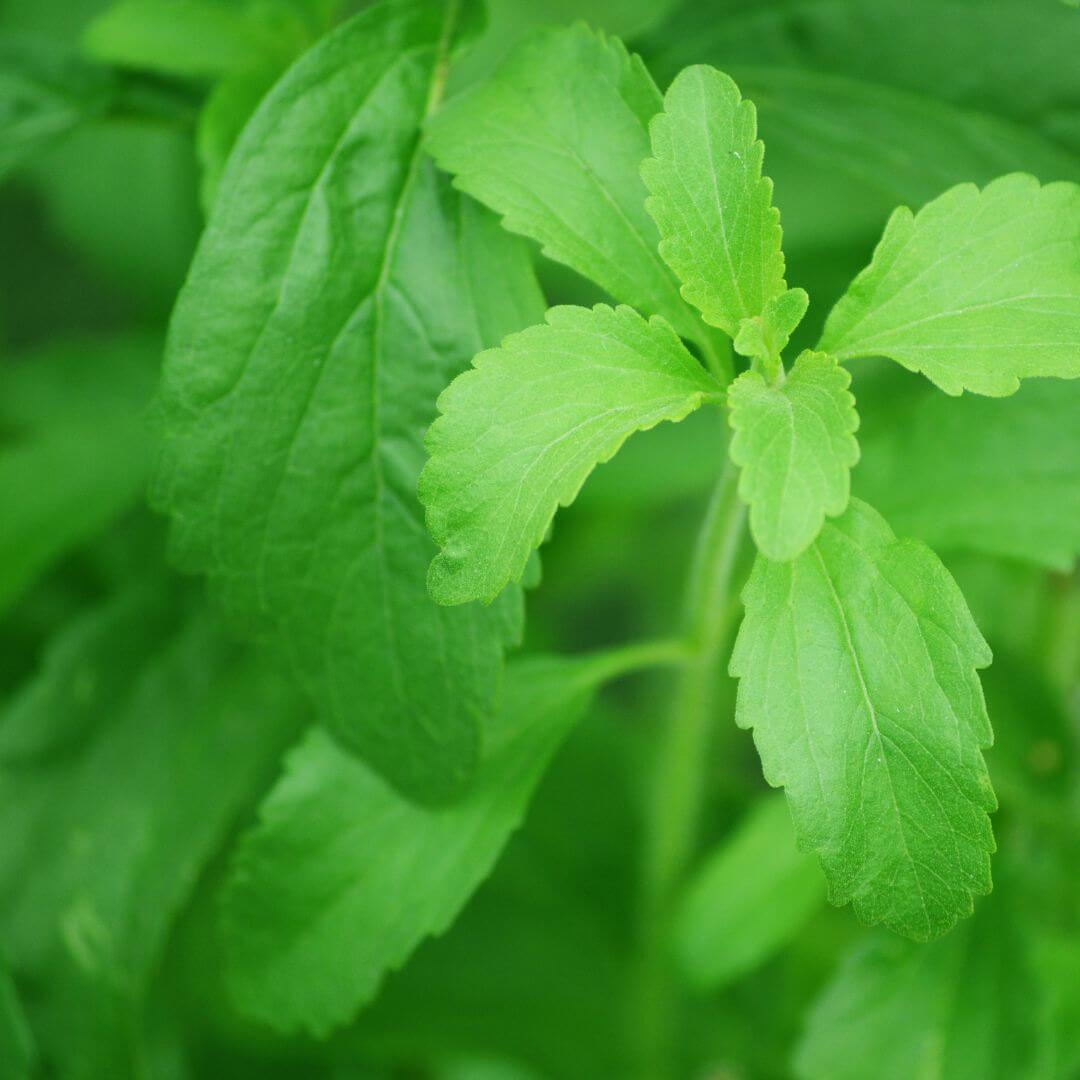Is Stevia an Endocrine Disruptor?
Is Stevia an Endocrine Disruptor?
Stevia rebaudiana, an herb native to Paraguay and Brazil, contains compounds called steviol glycosides which have about 50 to 300 times the sweetness of sugar. In recent years, stevia has become a fairly popular sugar substitute because it doesn't affect blood sugar and has zero calories. But one concern that has come to the forefront is stevia's potential to be an endocrine disruptor. An endocrine disruptor is a substance that can affect the body's hormone systems.
Let's look at the truth of the matter.
Stevia as Birth Control?
Is stevia an endocrine disruptor that can be used as birth control? In 1968 a study was published in Science magazine called "Contraceptive Properties of Stevia rebaudiana." The headline and abstract of the article are available, but none of the details are readily available online. The abstract reads:
"A water decoction of the plant Stevia rebaudiana Bertoni reduces fertility in adult female rats of proven fertility. The decoction continues to descrease [sic] fertility for at least 50 to 60 days after intake is stopped. The decoction did not affect appetite and apparently did not affect the health of adults rats."
Since this study 55 years ago, research has not been able to replicate these results. If stevia were an effective contraceptive, it certainly would make life easier for many women! Years later, the scientist that authored the study, Dr. Joseph Kruc, reportedly admitted to overdosing the animals with levels that would be impossible for a human to consume.
A more recent study found no reproductive effects in hamsters given stevia for three generations.
Benefits Found
 Stevia has been studied fairly extensively since then, with many benefits uncovered. Stevia has been found to be a powerful antioxidant with the ability to protect against oxidative stress. Stevia may also help lower blood pressure in people with hypertension. A study published in the European Journal of Clinical Nutrition found that consuming stevia for eight weeks significantly reduced both systolic and diastolic blood pressure.
Stevia has been studied fairly extensively since then, with many benefits uncovered. Stevia has been found to be a powerful antioxidant with the ability to protect against oxidative stress. Stevia may also help lower blood pressure in people with hypertension. A study published in the European Journal of Clinical Nutrition found that consuming stevia for eight weeks significantly reduced both systolic and diastolic blood pressure.
Contraceptive pills can increase LDL and decrease HDL levels in women, leading to a higher risk of cardiovascular disease. In 2021, researchers gave female rabbits oral contraceptives. The group of rabbits taking birth control pills saw their lipid profiles (HDL and LDL) become unhealthy. The second group of rabbits were also given birth control pills but also received stevia extract. In the study, the stevia extract protected the rabbits from developing an unhealthy lipid profile. The researchers suggested that adding daily stevia to your diet can help reduce heart disease.
Stevia has even been found to have anticancer properties, according to a 2021 study published in the journal Molecules. The next year an article was published in IUBMB Life (the flagship journal of the International Union of Biochemistry and Molecular Biology) that stevia extracts may have "potential anticancer activity against breast cancer, especially triple negative breast cancer (TNBC)."
Stevia has also been found to help support digestive function and to protect the epithelial cells of the large intestine, and can fight certain harmful pathogens in the gut. Gut health is also an important factor to support fertility and hormone health.
Positive Effects on Fertility
One of the most important properties of stevia is its ability to increase insulin sensitivity and aid in blood sugar stability. Insulin resistance is a key factor in hormone imbalances in women such as PCOS. And in fact, stevia has been found to rival the medication metformin in improving certain parameters and markers in PCOS, increasing insulin sensitivity and ovulation. Stevia has also been found to help increase production of progesterone to aid in hormone balance.
As scientists looked further to find out is stevia an endocrine disruptor, more information came to the forefront. In this study, stevia extract protected male rodents from a known endocrine disrupting chemical called tartrazine. And yet another study found that stevia protected the sperm and testes of male rats with diabetes.
A 2017 review found stevia was not teratogenic (causing birth defects) or mutagenic (damaging to DNA).
Finally, a 2023 systematic review and network meta-analysis looked at stevia and other non-caloric sweeteners and found no endocrine effects.
Is stevia an endocrine disruptor? Hardly. The evidence supports the notional that stevia supports fertility and endocrine health.
Is Stevia FDA-approved?
While some influencers and blogs claim stevia is not approved as a sweetener by the FDA, this is not true. Stevia extract is indeed FDA-approved and has earned GRAS status. (GRAS stands for Generally Recognized As Safe). Crude stevia (extracts or plant matter that has not been filtered) is not, however. This is where the confusion lies. Crude stevia extracts contain traces of essential oils, polyphenols, and other compounds have not been studied as extensively as steviol glycosides, so these extracts have not earned GRAS status to date.
What About Chemical Processing?
One objection I see among influencers who are set on confounding stevia's healthy reputation is that stevia is processed and extracted with harmful chemicals and sometimes mixed with other sweeteners like erythritol, which has garnered concern in recent years.
Simply choosing a USDA certified organic stevia extract will eliminate that concern, as organic production doesn't allow the majority of solvents and chemicals used in conventional stevia extract production. With organic production stevia is extracted with water, alcohol, heat, and filtered through a membrane not unlike one used in reverse osmosis filters to remove impurities. One widely-distributed notion is that stevia has to go through 42 steps during the extraction process and uses a toxic chemical called acetonitrile. While the notion of 42 steps is unsubstantiated (although widely distributed, I cannot find the origin of this idea) acetonitrile, methanol, and other chemicals mentioned in these diatribes are not allowed in USDA organic production.
Conclusion: Is stevia an endocrine disruptor
 Yes, stevia can alter our hormones -- but in a good way! Supporting blood sugar regulation, helping progesterone production, and fighting inflammation, stevia is a beneficial herb.
Yes, stevia can alter our hormones -- but in a good way! Supporting blood sugar regulation, helping progesterone production, and fighting inflammation, stevia is a beneficial herb.
Personal Note: I was drinking a lot of stevia-sweetened herbal tea in the months preceding my pregnancy and it's one of the things that I believe opened the door to fertility in my 41-year-old body with PCOS. If stevia has contraceptive properties, it certainly didn't work for me! For more information on the supplements I was taking prior to getting pregnant with PCOS, check out my PCOS Thrive Guide.
Recent Posts
-
Is Charcoal Safe in Deodorant?
Activated charcoal has become a popular natural ingredient in toothpaste, deodorant, soaps, facial c …5th Mar 2024 -
Is Stevia an Endocrine Disruptor?
Is Stevia an Endocrine Disruptor?Stevia rebaudiana, an herb native to Paraguay and Brazil, contains …9th Feb 2024 -
Is Aloe Vera Toxic?
Containing more than 200 different chemical compounds, aloe vera plants and extracts have long been …9th Feb 2024

